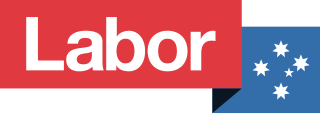Democratic Labour Party may refer to:

The Australian Labor Party (ALP), also commonly known as the Labor Party or simply Labor, is the major centre-left political party in Australia and one of two major parties in Australian politics, along with the centre-right Liberal Party of Australia. The party has been in government since being elected at the 2022 federal election, and with political branches in each state and territory, they currently form government in New South Wales, Queensland, South Australia, Victoria, Western Australia, the Australian Capital Territory, and the Northern Territory. As of 2023, Tasmania is the only state or territory where Labor forms the opposition. It is the oldest continuous political party in Australian history, being established on 8 May 1901 at Parliament House, Melbourne, the meeting place of the first federal Parliament.

The Democratic Labor Party (DLP) was an Australian political party. The party came into existence following the 1955 ALP split as the Australian Labor Party (Anti-Communist), and was renamed the Democratic Labor Party in 1957. In 1962, the Queensland Labor Party, a breakaway party of the Queensland branch of the Australian Labor Party, became the Queensland branch of the DLP.

Bartholomew Augustine Santamaria, usually known as B. A. Santamaria or Bob Santamaria and sometimes writing under the pseudonym John Williams, was an Australian Roman Catholic anti-communist political activist and journalist. He was a guiding influence in the founding of the Democratic Labor Party (DLP), the party that split from the Labor Party (ALP) in the 1950s.
Democratic Party and similar terms may refer to:
National Democratic Party may refer to:
Unionist Party may refer to:
National Executive Committee (NEC) is the name of a leadership body in several organizations, mostly political parties:
A political realignment, often called a critical election, critical realignment, or realigning election, in the academic fields of political science and political history, is a set of sharp changes in party ideology, issues, party leaders, regional and demographic bases of power of political parties, and the structure or rules of the political system, such as voter eligibility or financing. The changes result in a new political power structure that lasts for decades, replacing an older dominant coalition. Scholars frequently invoke the concept in American elections and occasionally those of other countries. American examples include the 1896 United States presidential election, when the issues of the American Civil War political system were replaced with those of the Populist and Progressive Era, and the 1932 United States presidential election, when the Populist and Progressive Eras were replaced by the New Deal-era issues of New Deal liberalism and modern conservatism. Realigning elections typically separate party systems—with 1828, for example, separating the First Party System and the Second Party System in the US. It is generally accepted that the United States has had five distinct party systems, each featuring two major parties attracting a consistent political coalition and following a consistent party ideology, separated by four realignments.
John, Jon, or Jonathan Robertson may refer to:
A dominant-party system, or one-party dominant system, is a political occurrence in which a single political party continuously dominates election results over running opposition groups or parties. Any ruling party staying in power for more than one consecutive term may be considered a dominant party. Some dominant parties were called the natural governing party, given their length of time in power.
National Labour Party can refer to:
A leadership election is a political contest held in various countries by which the members of a political party determine who will be the leader of their party.
DLP may refer to:
The Japan Socialist Party was a major Japanese political party that existed from 1945 to 1996.
Labour Party or Labor Party is a name used by many political parties.
William Peter Barry was a Member of the Victorian Legislative Assembly for the Electoral district of Carlton from July 1932 until April 1955. Barry was a member of the Labor Party until March 1955, when he was expelled from the party as part of the Australian Labor Party split of 1955. He became, with Les Coleman in the Victorian Legislative Council, joint leader of the Australian Labor Party (Anti-Communist), a party that in 1957 became the Democratic Labor Party.
2010 Labour Party leadership election may refer to:
The Australian Labor Party split of 1955 was a split within the Australian Labor Party along ethnocultural lines and about the position towards communism. Key players in the split were the federal opposition leader H. V. "Doc" Evatt and B. A. Santamaria, the dominant force behind the "Catholic Social Studies Movement" or "the Movement".
Socialist Party is the name of many different political parties around the world. All of these parties claim to uphold some form of socialism, though they may have very different interpretations of what "socialism" means. Statistically, most of these parties advocate either democratic socialism, social democracy or even Third Way as their ideological position. Many Socialist Parties have explicit connections to the labor movement and trade unions. A number of affiliates of the Trotskyist International Socialist Alternative also use the name "Socialist Party".
Labour government or Labor government may refer to: